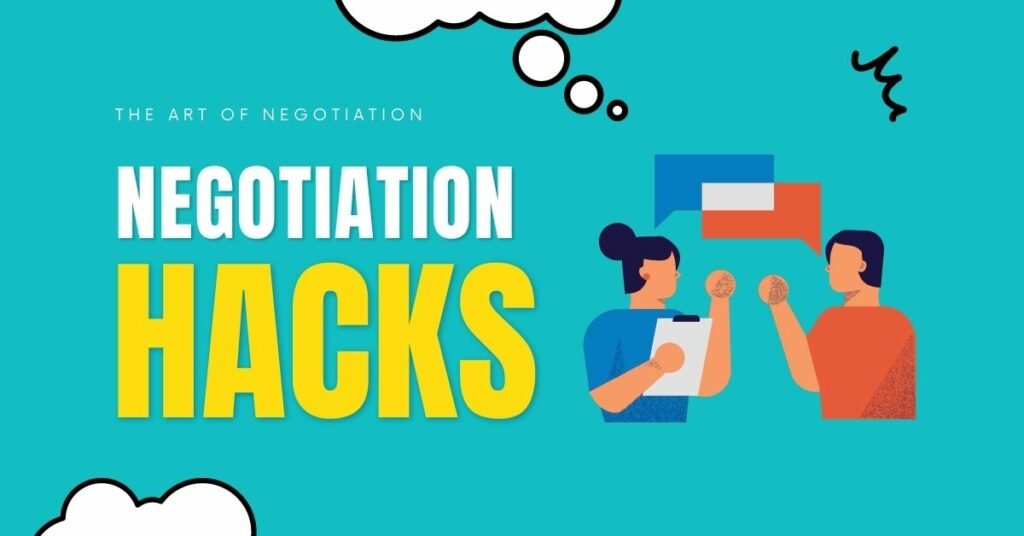Everyone, whether in business, politics, or everyday life, should be able to negotiate effectively. Finding common ground and achieving the best result for all parties concerned are the main goals of negotiation.
But, if you don’t have the necessary abilities and tactics, negotiating can be difficult and frustrating. In this article, we will share 10 Tips for Getting the Best Deals through the art of negotiation.
Understanding Negotiation
The process of coming to an agreement between two or more people that have conflicting interests or goals is known as negotiation. It involves communication, compromise, and finding common ground to achieve a mutually beneficial outcome. Negotiation is important for several reasons:
Resolving conflicts: Negotiation can help resolve conflicts in both personal and professional settings.
Creating value: Negotiation can create value by finding innovative solutions that benefit all parties involved.
Building relationships: Negotiation can help build relationships by establishing trust and understanding between parties.
Saving time and resources: Negotiation can save time and resources by avoiding unnecessary disputes or litigation.
Decision-making can be improved through negotiation by taking into account many points of view and determining the optimal result for all parties.
Increasing satisfaction: Negotiation can increase satisfaction by finding solutions that meet the needs and interests of all parties involved.
In summary, negotiation is a crucial skill for achieving success in both personal and professional settings. It enables parties to find mutually beneficial solutions, resolve conflicts, and build relationships, ultimately leading to better outcomes for everyone involved.
10 Tips for Getting the Best Deals Using the Art of Negotiation
1. Prepare and Research
One of the essential things in negotiation is to be prepared. Research and understanding both your own requirements and interests, as well as those of the opposing side, are necessary before you begin negotiating. You should be aware of your goals and your willingness to make sacrifices.
Knowing your BATNA (Best Alternative to a Negotiated Agreement) is crucial in negotiation.

It’s crucial to keep the following things in mind as you get ready for negotiation
- Before you begin negotiating, do some research on the other side to learn about their requirements, interests, and values. This information can help you develop a strategy and find common ground.
- Set your goals: Decide what you want to achieve from the negotiation and be clear about your priorities.
- Consider your BATNA: Know what your Best Alternative to a Negotiated Agreement is, as this will help you evaluate the deal on the table and determine whether it’s the best option for you.
A Quick Overview of BATNA and its Benefits
BATNA stands for “Best Alternative To a Negotiated Agreement”. It refers to the course of action a party will take if negotiations fail and no agreement is reached. Understanding your BATNA is important because it helps you determine your bargaining power and sets a baseline for evaluating any proposed agreements.
If your BATNA is strong, you have more leverage in the negotiation and can be more confident in rejecting a bad deal. Some benefits of knowing your BATNA include:
- Increased confidence: Knowing your BATNA can increase your confidence in the negotiation process and give you a clear sense of what you are willing to accept.
- Better decision-making: Knowing your BATNA can help you make better decisions during negotiations by setting a baseline for evaluating any proposed agreement.
- Improved outcomes: Knowing your BATNA can lead to better outcomes by allowing you to negotiate from a position of strength.
- Avoiding bad deals: Knowing your BATNA can help you avoid bad deals that would be worse than your alternatives.
- Saving time and resources: Knowing your BATNA can save time and resources by avoiding negotiations that are unlikely to lead to a satisfactory agreement.
In summary, understanding your BATNA is an important part of the negotiation that can help you achieve better outcomes, avoid bad deals, and save time and resources.

Leave a Reply